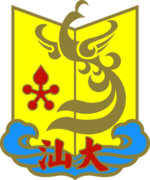Shantou University
| 汕头大学 | |
 |
|
| Motto | 有志, 有识, 有恒, 有为 |
|---|---|
|
Motto in English
|
Aspiration, Knowledge, Perseverance, Achievement |
| Type | Public |
| Established | August 26, 1981 |
| Endowment |
HK$6 billion US$0,77 billion |
| President | Xu Xiaohu |
| Location |
|
| Campus | Main campus Medical College |
| Sponsor | Li Ka Shing Foundation |
| Website | http://www.stu.edu.cn |
Shantou University (Chinese: 汕头大学; pinyin: Shàntóu Dàxué; abbreviated STU), a key comprehensive university under the provincial Project 211 program in Guangdong, was founded in 1981 with the approval of the State Council. It is the only public university that receives funding from the Li Ka Shing Foundation. It is also supported by the Ministry of Education (MOE), the Guangdong Provincial Government and the Li Ka Shing Foundation. STU is located in Shantou, a city in Southeast China. Surrounded by mountain and water, the university campus is adorned by elegant and artistic buildings.
Shantou University (STU) was founded in 1981 and started student enrollment in 1983. It is the only institution of higher education in the Chaoshan area.
STU, a key comprehensive university under the provincial Project 211 program, was founded in 1981 with the approval of the State Council. As the only public university that receives long-term funding from the Li Ka Shing Foundation, it is jointly supported by the Ministry of Education, the Guangdong Provincial Government and the Li Ka Shing Foundation. The Li Ka Shing Foundation has committed and donated a total of HK$5.4 billion to support Shantou University (including the Cheung Kong Graduate School of Business), of which HK$4.2 billion has already been donated as of 2012.
STU is committed to the student-centered reform in terms of university administration and talent training, in order to cultivate talents with the motto, “Aspiration, Knowledge, Perseverance, Achievement”. It is also planning to relocate the Medical College into the main campus and to develop a globally advanced curriculum focusing on life science. Since 2001, the University has conducted a profound internationalization-oriented reform, and overseas talents have been recruited to serve as provost, vice president and deans. Through a series of reforms in curriculum design, teaching, resources management and human resources system, it aims to offer a platform for the exploration of higher educational reform in China. With its successful innovations, the University was highly appraised by Comrade Li Lanqing, member of the Standing Committee of Political Bureau of the CPC Central Committee and Vice Premier of the State Council, as “the pilot site for higher educational reform in China.”
...
Wikipedia
